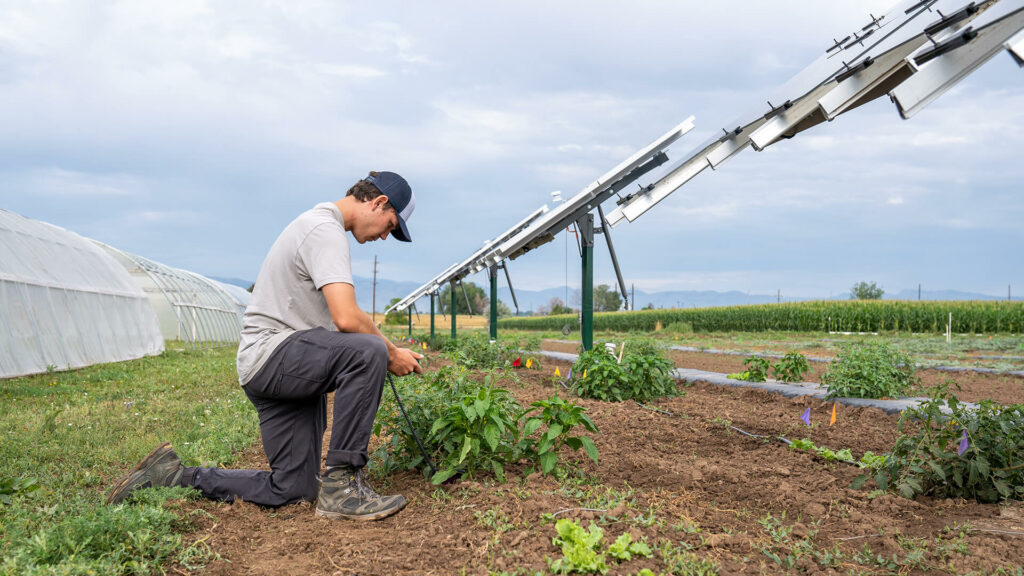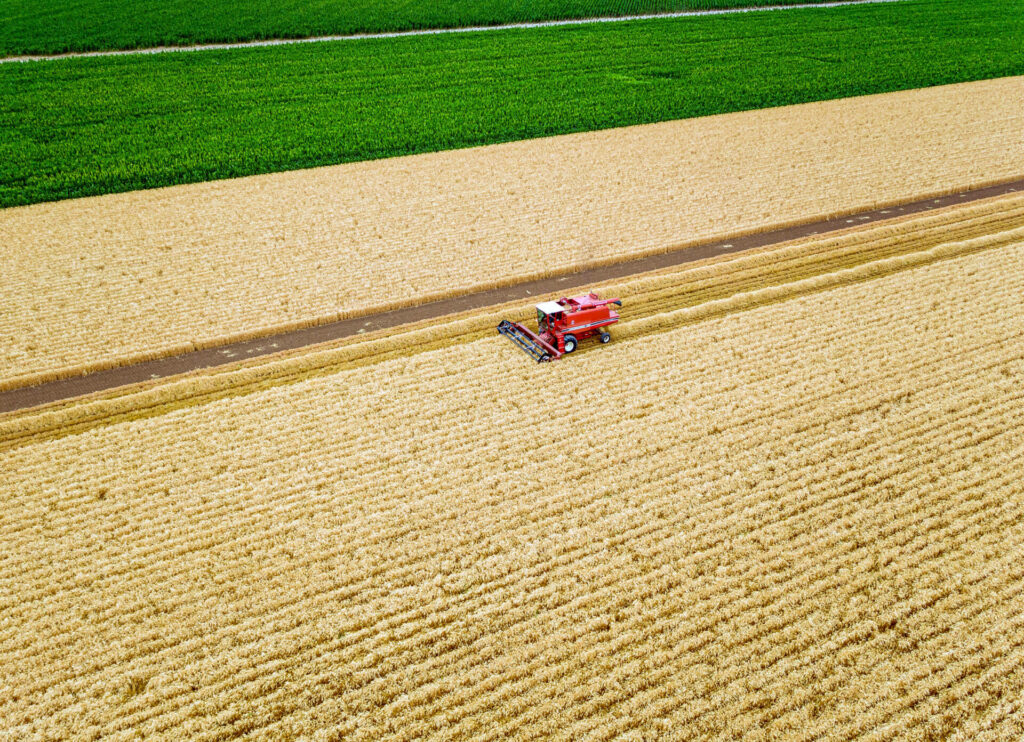As someone who studies food systems for a living, change has proven an enduring constant for me, especially considering recent waves of disruptive events. COVID-19 pandemic. Drought. Animal disease outbreaks such as avian flu. The war in Ukraine. Roller-coaster interest rates. And the many perturbations as climate change quickens.
Food prices, too, have been widely unpredictable. The food-at-home consumer price index in November 2022 was 12% higher than the previous year. Egg prices have soared some 60% from the year prior, while other staples such as butter, coffee, milk, potatoes, and bread have seen year-over-year price changes in the 15% to 25% range.
The research, learning, and engagement ecosystem at Colorado State University is exceptionally well-positioned to address today’s seemingly intractable food system-related challenges.
It would be easy to adopt a sky-is-falling mindset given the unpredictability. “Wicked problems” are wicked, after all, precisely because they seem intractable. The research, learning, and engagement ecosystem at Colorado State University is exceptionally well-positioned to address today’s seemingly intractable food system-related challenges. The “system” designate entails going beyond supply chains and their efficiencies; it encompasses elements of food and agriculture that touch all disciplines, from STEM fields to the humanities; hence, the CSU value proposition for grappling with food systems-related tensions. The University is positioned, thanks to institutional assets and breadth of expertise, to do the work that needs to be done to innovate and discover as we work with stakeholders to collaboratively build more equitable and resilient food systems.
A Harvest of Student Researchers
One commodity the University grows best is students who can shape communities. Consider the CSU Extension Internship Program. It began in 2018 as a collaboration among the Office of Engagement and Extension, College of Liberal Arts, College of Agricultural Sciences, and the Office of the Vice President for Research. Since then, it has grown into a program that has connected students and faculty from all colleges with Extension personnel across all 64 Colorado counties while engaging in applied, community-directed research. Last year, there were 79 internships. In the words of Aisha Martinek, a student in the College of Agricultural Sciences who helped promote consumption of fruit and vegetables at food banks in Larimer County: “This internship really helped highlight that my passion is making a positive impact in the communities that I’m working in.” Each intern is paired with faculty on campus and field-based Extension staff. Each internship is also designed around an issue important to the community that requires a homegrown research collaboration. Interns are paid for their efforts and embedded in communities for about 10 weeks in the summer.
“This internship really helped highlight that my passion is making a positive impact in the communities that I’m working in.”
Aisha Martinek, College of Agricultural Sciences student
An example of a food systems-related internship is, “Agrivoltaics: From Farm Fields to Rooftops.” Agrivoltaics refers to co-locating of food production (cultivation crops, specialty crops, and livestock) and energy production, typically solar panels. Agrivoltaic growing systems are still in their infancy. This internship, involving two students, sought to evaluate the feasibility of growers producing both crops and energy in the same space. One of the findings, lending support to the idea that synergies exist, was that solar panels shade crops enough to reduce temperature variations compared to typical field conditions. Meanwhile, solar panel performance was also improved because of the evaporative cooling that the plants provide. This internship experience is an excellent example of how projects can provide CSU researchers “first-mover” status for investigating and evaluating emerging innovations and technologies, thus strategically positioning experts as early contributors in these discussions.

Agrivoltaics is a way to make the land produce renewable power as well as food. Credit: Savannah WaggonerAnother example was the internship titled, “Avian Health.” In December 2021, the Eurasian strain of highly pathogenic avian influenza was reported in Canada and was soon detected in birds in the United States. Highly pathogenic avian influenza is a virus that occurs in birds and is highly contagious, spreading rapidly through entire flocks and resulting in sudden death. At CSU, the Colorado Avian Health Program coordinator works closely with the State Veterinarian’s Office to test and monitor for different diseases, including HPAI. With the supervision of faculty and Extension personnel associated with the Colorado Avian Health Program, the intern gained experience testing various species of birds for avian influenza virus. These activities included the student attending county fairs in Douglas, Adams, Elbert, and Jefferson counties where they performed health exams on 4-H birds before they entered the fairgrounds. The intern also discussed health and husbandry with 4-H participants, their families, and other fair attendees.
Rural Resources Feed Urban Appetites
Closer to big cities, CSU recognized the need to better align urban food with rural agriculture. Six years ago, the CSU Food Systems Institute emerged with a grant under the Catalyst for Innovative Partnerships program through the Office of the Vice President for Research. Becca Jablonski, an associate professor in the College of Agricultural Sciences, and I became co-directors. The institute asked the question: What types of urban food policies, programs, and initiatives along the Front Range support farmers, ranchers, regional communities, and economies across Colorado?
Urban food policy plans have become ubiquitous in cities of all sizes. They take a multifaceted approach to food procurement, urban food production, economic development, food access, the environment, and food recovery. In all, 260 cities with 450 million people have signed the Milan Urban Food Policy Pact to work for more equitable, transparent, and resilient urban food systems. Hundreds more cities are working independently to engage with community leaders, interest groups, the private sector, and civil society to improve food access and diet quality, minimize waste, and conserve biodiversity. One factor driving metropolitan governments to implement urban food plans is the desire to gain some control over food systems. At the same time, it bears asking how do urban food policy plans impact farm and rancher livelihoods and rural economies? There’s a lot of purchasing power potential; consider 90,000 students are enrolled in Denver public schools.

Barry Ogg, research associate - plant breeding and genetics in the Department of Soil and Crop Sciences in the College of Agricultural Sciences at CSU, harvests wheat at the Agricultural Research, Development, and Education Center. Credit: Joe A. Mendoza, CSU PhotographyDrawing from abundant data, an interdisciplinary team of more than 30 faculty and students simulated various scenarios to help Colorado stakeholders make research-informed decisions about policy trade-offs. The research integrated economic data, social decision-making factors, biophysical crop data, and life-cycle analyses, which allowed the team to model a variety of potential changes to the Denver food policy environment and to observe any effects or feedbacks throughout various stages of the supply chain to better understand how metropolitan food policies impact livelihoods, economies, and natural resource stocks in the countryside. This work resulted in a mapping tool that can be used by communities throughout the state as food system initiatives are planned, implemented, and evaluated for the social, environmental, and economic effects.
Beyond the Food Systems Institute, it’s impossible to fully reckon CSU’s contributions to food systems resiliency when so much effort is marshaled across so many experts. CSU is at the cutting edge of research when it comes to wicked problems relating to food and agriculture, as evidenced by these examples. It’s a story that will continue for years to come.
Michael Carolan is co-director and co-founder of the Food Systems Institute for Research, Engagement, and Learning at Colorado State University and professor of sociology in the College of Liberal Arts. He is author of the book, A Decent Meal: Building Empathy in a Divided America.